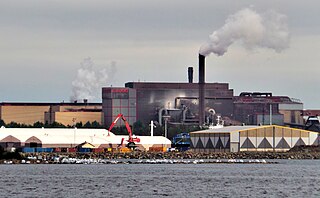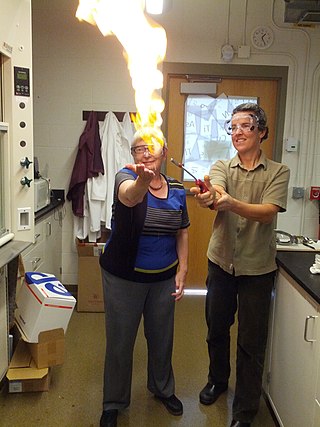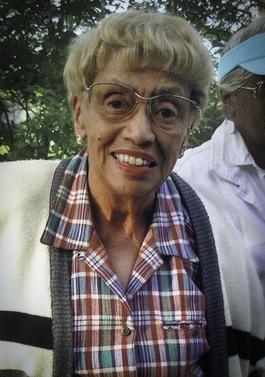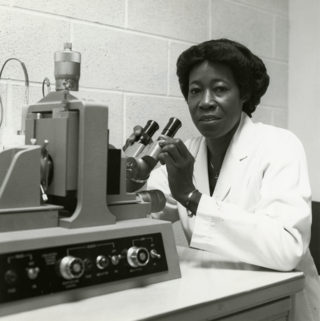Related Research Articles

Environmental chemistry is the scientific study of the chemical and biochemical phenomena that occur in natural places. It should not be confused with green chemistry, which seeks to reduce potential pollution at its source. It can be defined as the study of the sources, reactions, transport, effects, and fates of chemical species in the air, soil, and water environments; and the effect of human activity and biological activity on these. Environmental chemistry is an interdisciplinary science that includes atmospheric, aquatic and soil chemistry, as well as heavily relying on analytical chemistry and being related to environmental and other areas of science.

Alexandra Navrotsky is a physical chemist in the field of nanogeoscience. She is an elected member of the United States National Academy of Sciences (NAS) and the American Philosophical Society (APS). She was a board member of the Earth Sciences and Resources division of the NAS from 1995 until 2000. In 2005, she was awarded the Urey Medal, by the European Association of Geochemistry. In 2006, she was awarded the Harry H. Hess Medal, by the American Geophysical Union. She is currently the director of NEAT ORU, a primary program in nanogeoscience. She is distinguished professor at University of California, Davis.

Felisa Wolfe-Simon is an American microbial geobiologist and biogeochemist. In 2010, Wolfe-Simon led a team that discovered GFAJ-1, an extremophile bacterium that they claimed was capable of substituting arsenic for a small percentage of its phosphorus to sustain its growth, thus advancing the remarkable possibility of non-RNA/DNA-based genetics. However, these conclusions were immediately debated and criticized in correspondence to the original journal of publication, and have since come to be widely disbelieved. In 2012, two reports refuting the most significant aspects of the original results were published in the same journal in which the original findings had been previously published.

Jewel Plummer Cobb was an American biologist, cancer researcher, professor, dean, and academic administrator. She contributed to the field of cancer research by studying the cure for melanoma. Cobb was an advocate for increasing the representation of women and students of color in universities, and she created programs to support students interested in pursuing graduate school.

Bettye Washington Greene was an American industrial research chemist. She was the first African American female Ph.D. chemist to work in a professional position at the Dow Chemical Company. At Dow, she researched latex and polymers. Greene is considered an early African American pioneer in science.

Judith P. Klinman is an American chemist, biochemist, and molecular biologist known for her work on enzyme catalysis. She became the first female professor in the physical sciences at the University of California, Berkeley in 1978, where she is now Professor of the Graduate School and Chancellor's Professor. In 2012, she was awarded the National Medal of Science by President Barack Obama. She is a member of the National Academy of Sciences, American Academy of Arts and Sciences, American Association for the Advancement of Science, and the American Philosophical Society.
Cornelia Denson Gillyard is an American organic chemist known for her work with chemicals in the environment.
Barbara Ross-Lee, D.O. is an American physician, academic, and the first African-American woman to serve as dean of a U.S. medical school; she is also known as the sister of global music sensation Diana Ross along with being the aunt of actress Tracee Ellis Ross, and singer-songwriters Rhonda Ross Kendrick and Evan Ross. She majored in biology and chemistry at Wayne State University, graduating in 1965. Then, in 1969, she entered Michigan State University's College of Osteopathic Medicine. Ross-Lee then went on to open her own private family practice, teach as a professor, and hold other positions within the medical community. In 1993, she was elected as the first woman dean of a medical school, at Ohio University's Heritage College of Osteopathic Medicine. She has earned several awards and honors for her work and accomplishments.
Shirley Ann Mathis McBay was an American mathematician who was the founder and president of the Quality Education for Minorities (QEM) Network, a nonprofit dedicated to improving minority education. She was the dean for student affairs at the Massachusetts Institute of Technology (MIT) from 1980 to 1990. She was the first African American to receive a Ph.D. from the University of Georgia. McBay was recognized by Mathematically Gifted & Black as a Black History Month 2017 Honoree.
Lisa Michelle Jones is an associate professor of pharmaceutical sciences at the University of Maryland, Baltimore (UMB). Her research is in structural proteomics, using mass spectrometry together with fast photochemical oxidation of proteins (FPOP), allowing researchers to study the solvent accessibility of proteins experimentally.

Brandeis Marshall is an American data scientist, CEO of DataedX, and Full Professor of Computer Science at Spelman College, where she is the former Chair of the Department of Computer and Information Sciences. Starting in September 2019, Marshall is a faculty associate at Berkman Klein Center for Internet & Society at Harvard University. She has also worked to broaden participation in the field of data science to increase representation of underrepresented minorities, including her effort 'Black Women in Data'.
Kimberly A. Prather is an American atmospheric chemist. She is a distinguished chair in atmospheric chemistry and a distinguished professor at the Scripps Institution of Oceanography and department of chemistry and biochemistry at UC San Diego. Her work focuses on how humans are influencing the atmosphere and climate. In 2019, she was elected a member of the National Academy of Engineering for technologies that transformed understanding of aerosols and their impacts on air quality, climate, and human health. In 2020, she was elected as a member of the National Academy of Sciences. She is also an elected Fellow of the American Philosophical Society, American Geophysical Union, the American Association for the Advancement of Science, American Philosophical Society, and the American Academy of Arts and Sciences.
Sherine O. Obare is the dean of the Joint School of Nanoscience and Nanoengineering at the University of North Carolina at Greensboro and North Carolina Agricultural and Technical State University. She works on nanomaterials for sensing and drug delivery.
Jennifer G. Murphy is a Canadian environmental chemist and an associate professor at the University of Toronto. She is known for her research how air pollutants such as increased reactive nitrogen affect the global climate.

Nadine Unger is a Professor of Atmospheric Chemistry at the University of Exeter. She has studied the role of human activities and forests on the Earth's climate.
Tameka A. Clemons is an African American biochemist at Tilman J. Fertitta Family College of Medicine at University of Houston in Houston, Texas. Clemons holds the title of Clinical Associate Professor of Biochemistry in the Department of Biomedical Sciences. Her research focuses on exploring the link between Type II diabetes and Alzheimer's disease by analyzing the aberrant biochemical signaling networks in pancreatic beta-cells and neuronal cells that leads to cell death in Type II diabetes and Alzheimer's Disease. Clemons was one of the inaugural recipients of the Alfred P. Sloan Foundation Minority Ph.D. Program Fellowship and in 2020, she was named one of the top 100 Inspiring Black Scientists in America by CellPress.

Maria Elena Zavala is an American plant biologist. She was the first Mexican-American woman to earn a PhD in botany in the United States. She is currently a full professor of biology at the California State University-Northridge, studying plant development. She is a Fellow of the American Association for the Advancement of Science, the first Latina fellow of the American Society of Plant Biologists, the first Latina fellow of the American Society of Cell Biology, and an elected fellow of the Institute of Science. In 2000, she was awarded the Presidential Award for Excellence in Science, Mathematics, and Engineering Mentoring, which recognises individuals who have increased the participation of underrepresented minorities in their fields.
Barbara Jo Turpin is an American chemist who is a Professor of Atmospheric Chemistry at the University of North Carolina at Chapel Hill. Her research considers aerosol science and environmental engineering. Turpin studies the formation of organic particulate matter via aqueous chemistry. She was awarded the 2018 American Chemical Society Award for Creative Advances in Environmental Science and Technology. Turpin is a Fellow of the American Association for Aerosol Research, American Geophysical Union and American Association for the Advancement of Science.

Staci Simonich is an American environmental scientist who is a professor and dean for the College of Agricultural Sciences at Oregon State University. Her research considers how chemicals move through the environment. She was appointed Fellow of the American Association for the Advancement of Science in 2021.
Stephanie Louise Pfirman is a professor at Arizona State University known for her work on sea ice, pollutants in sea ice, and how sea ice is changing over time. She is a fellow of the American Association for the Advancement of Science.
References
- 1 2 3 4 5 6 "Krishna Foster's Biography". The HistoryMakers. Retrieved 2020-08-02.
- ↑ "Krishna Foster, C'92". www.spelman.edu. Retrieved 2020-08-21.
- 1 2 3 Foster, Krishna (2002-03-01). "Awakening at Sunrise: How My Arctic Experience Shaped My Career Goals". Science | AAAS. Retrieved 2020-08-02.
- ↑ "Krishna Foster, Ph.D. | CSU". www2.calstate.edu. Retrieved 2020-08-02.
- ↑ "Biography Page for Krishna Foster". www.idvl.org. Retrieved 2020-08-02.
- 1 2 "Cal State LA professor recognized as Minority Access National Role Model". Cal State LA. 2016-08-25. Retrieved 2020-08-02.
- ↑ "2014–15 Project SEED College Scholarships". Chemical & Engineering News. Retrieved 2020-08-02.
- ↑ "Cal State LA chemistry professor recognized as Minority Access National Role Model". Los Angeles Sentinel. 2016-09-01. Retrieved 2020-08-02.